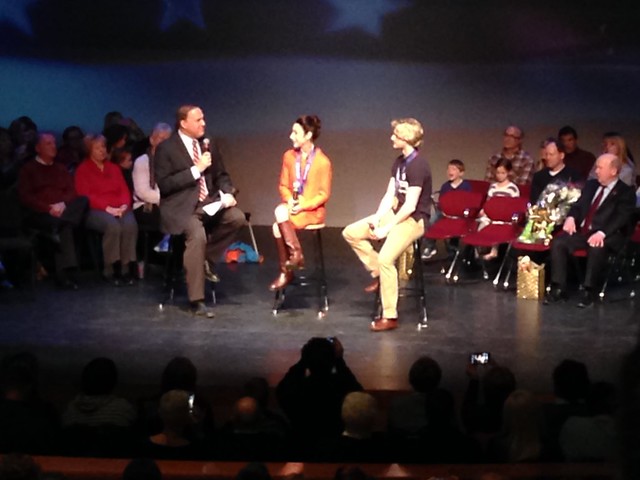The human drama of that moment in history is what led me to watch, but eventually I realized there was so much this sport had to offer, which is why I continue to watch it twenty years later. As a girly-girl who loved sequins and sparkles, I of course loved seeing the glamorous costumes, but that superficial fascination eventually evolved into something much deeper. Skating is not just a sport. It is also an art. The opportunity skaters have to create, not just triumphant feats of athleticism, but also brilliant moments of artistry and emotion, sets it apart from all the other Olympic sports. When I watch a performance like Michelle Kwan's 2003 World Championship long program, I don't care about the jumps. Yes, landing all those jumps punctuates her brilliant performance, but she did more than just land jumps. She created a Moment.
So fast forward twenty years from 1994 when I first became a fan of skating to today, March of 2014. I live in Canton, Michigan, which happens to be where the Olympic gold medal ice dancing team of Meryl Davis and Charlie White train. Yesterday was their welcome home celebration at a local
 theater, and at one point in the program, the emcee asked Meryl and Charlie how their coach, Marina Zoueva, has helped make them the champions they are today. Meryl's response really struck me. Instead of saying something like, "Marina is a great technician and really taught us proper technique," she instead said something very simple and yet profound: "We've learned about life and art from Marina." Marina has coached and choreographed for many skating champions. She is known for creating stunning, memorable, and heartfelt programs as well as pushing and bringing out of her skaters more than they thought was possible. She doesn't just focus on technique, but really tries put the heart and soul of her skaters in their performances.
theater, and at one point in the program, the emcee asked Meryl and Charlie how their coach, Marina Zoueva, has helped make them the champions they are today. Meryl's response really struck me. Instead of saying something like, "Marina is a great technician and really taught us proper technique," she instead said something very simple and yet profound: "We've learned about life and art from Marina." Marina has coached and choreographed for many skating champions. She is known for creating stunning, memorable, and heartfelt programs as well as pushing and bringing out of her skaters more than they thought was possible. She doesn't just focus on technique, but really tries put the heart and soul of her skaters in their performances.Meryl's comment about Marina really struck me because it reminded me of the things all great teachers do for their students. No matter what quest you are pursuing: sport, education, music, or writing, all great teachers help their pupils move beyond skill into something much bigger than themselves.
And this is precisely what breaks my heart about our educational climate today. In their quest for American students to have the best "technical merit" (to use a skating term), educational policymakers have completely reformed the "artistic impression" out of our schools, which is the heart and soul of a performance in skating, and in the case of education, it's what makes our students and teachers unique individuals.
I don't want to watch a skating performance that is all skill and no heart, and I certainly don't want to teach in a classroom that is that way either. But if you give me scripted lessons, if you force me to teach to a test, and you whittle away any sense of joy or excitement from the learning process, you can be sure that not only will the artistic impression suffer, but the technical merit will too. There has to be passion in order for there to be excellence, and I fear that we're forgetting that like all great performances, it's the passion that creates the Moment, not the technique. And in school, if we don't create opportunities for our students to learn about life and art, education will not be a goal students want to pursue. So no matter how much you mandate and test them to death, all you will do is create a piecemeal set of skills and no artistry to be able to create magical Moments in the life of a child.

Yes! Thank you for this articulate statement about the problem with the testing trend in education. I believe that the most important "lessons" that we teach are not measurable by a test; yes, we're teaching the craft of writing or the causes of WW I, but what we are also teaching students is how to approach life and how to live with purpose and grace. I hope.
ReplyDelete